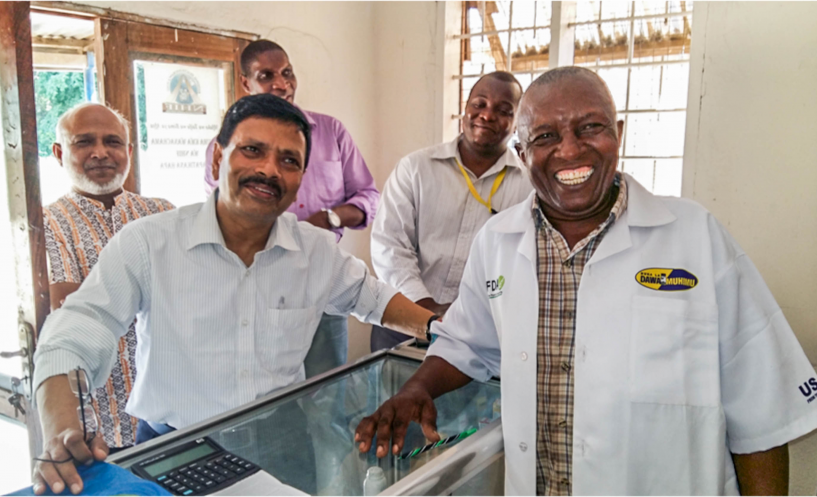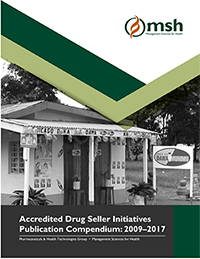Retail Drug Outlets: Developing their Potential to Improve Public Health in a Growing Number of Countries
Retail Drug Outlets: Developing their Potential to Improve Public Health in a Growing Number of Countries

In recent years, global health stakeholders have begun to recognize the profound potential that drug shops have to advance public health goals, such as those related to malaria diagnosis and treatment, child health, and family planning. These outlets, for reasons of convenience and cost, are the first choice of care for millions of people – and until recently, they have largely been ignored.
“Drug shops and pharmacies are important sources of health care, particularly in rural areas or urban slums with few public clinics. They are often the first stop for women and men who seek FP information or services.”
World Health Organization
This is why, in 2003, Management Sciences for Health (MSH) helped launch the Accredited Drug Dispensing Outlet (ADDO) Program in Tanzania to address the important role of these informal drug sellers by creating certain standards that, when met, increase the quality of medicines and services in the community. Tanzania’s successful ADDO Program provides a model that other countries in Africa—and now Asia—have adapted and made their own.
LaunchDSI is the fourth program funded by the Bill & Melinda Gates Foundation to increase access to quality pharmaceutical products and services in drug shops. Planning and launching an accreditation initiative is a major decision and commitment for a country. LaunchDSI offers countries an easy way to get answers regarding the feasibility of adapting the model or direction for implementation. Through the program, MSH organizes study visits to Tanzania so country representatives can learn about the ADDO program first-hand. LaunchDSI also provides access to seed funds to kick-start program development, including stakeholder engagement and policy change.
The accredited drug seller initiative grows in Africa
Tanzania’s forward-thinking view of improving drug seller quality through standards setting and training has resulted in a nationwide program with more than 12,000 accredited shops. And now, accredited drug seller models, regulations, and standards have been developed for Uganda, Liberia, Nigeria, and Zambia.
Uganda’s National Drug Authority has accredited almost 1,000 shops in 13 districts, 11 of which were funded by the government. Accredited drug shop (ADS) dispensers and owners pay for their own training at one of four participating institutions. With support from MSH, staff from these institutions received training on best practices in adult-focused learning. Inspectors use supportive supervision tools, and ADS dispensers receive self-assessment checklists and training on how to use them.
In Liberia, implementation of the Accredited Medicine Shop (AMS) Program is ongoing in four counties, with funding coming primarily from the government. Interest in participation has far exceeded government expectations with more than 1,000 people trained. During Liberia’s Ebola outbreak, when much of the health system shut down, most AMS continued to provide medicines and health commodities to the community.
The Pharmacists Council of Nigeria (PCN) has regulatory oversight of around 200,000 patent and proprietary medicine shops (PPMVs) across the vast country. By adapting MSH’s accreditation model, PCN is repositioning PPMVs within the Nigerian health system and developing a better engagement framework by working with a wide range of stakeholders, including PPMV associations, to establish standards of practice that will harmonize training and operations.
To advance its accreditation initiative, the Zambia Medicines Regulatory Authority mobilized a health shops national steering committee, drafted guidelines, and collaborated with the Pharmaceutical Society of Zambia to adapt existing training materials. As in Uganda, MSH sponsored training-for-trainers on effective teaching practices.
Introducing ADS in Asia
With support from the UK Department for International Development and in collaboration with the Bangladesh Directorate General for Drug Administration, MSH marshaled the support of a wide range of public and private sector stakeholders to establish the country’s first-ever standards for retail drug outlets. Two Bangladesh groups visited Tanzania, which cemented their commitment to making sweeping regulatory changes covering infrastructure, training and qualifications, services, and products. Stakeholders helped draft an accreditation implementation strategy that included training, economic incentives for owners, information technology, and consumer advocacy.
“Our dispensing practices have very much improved. We now don’t sell medicines for the sake of income, but provide proper treatment so that clients get healed.”
Owner and dispenser, Songea, Tanzania
Building an evidence base

Having worked on MSH’s drug seller initiative since 2003, I find it gratifying that our original accreditation work is serving as a model for other countries to improve access to quality pharmaceutical products and services. I’m also thrilled to see increasing global recognition of the powerful potential of drug shops to contribute to important public health goals.
Results of our operational research in Tanzania are summarized in our Accredited Drug Seller Initiatives Publication Compendium.